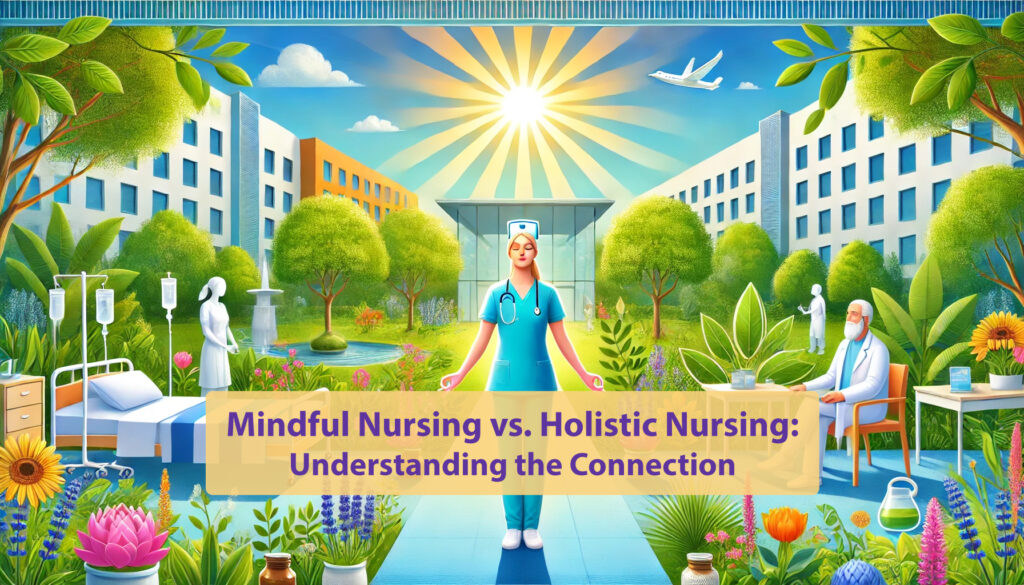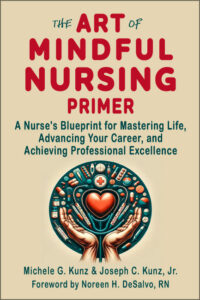Subtitle
Integrating Mindfulness and Holistic Practices for Enhanced Nursing Care
Synopsis
This article explores the relationship between mindful nursing and holistic nursing, two approaches that emphasize comprehensive, compassionate patient care. While distinct in their methodologies, both share common principles that can enhance nursing practice, improve patient outcomes, and foster professional growth. By understanding and integrating these philosophies, nurses can contribute to a more empathetic and effective healthcare system, ultimately leading to a more fulfilling and impactful career.

Introduction
In the ever-evolving field of nursing, various approaches and philosophies contribute to patients’ holistic care and well-being. Among these, mindful nursing and holistic nursing are prominent practices emphasizing comprehensive, compassionate care.
Although they share common elements, they are distinct in their methodologies and applications. Understanding the connection and differences between mindful nursing and holistic nursing can profoundly enhance the practice of nursing professionals, leading to better patient outcomes and more fulfilling careers.
This article delves into the essence of these two approaches, explores their interrelation, and underscores the importance of nurses integrating these concepts into their daily practice.
A. What is Mindful Nursing?
Mindful nursing is being fully present and engaged while providing care. This approach emphasizes mindfulness, awareness, and attention to the present moment without judgment. In mindful nursing, practitioners focus on their thoughts, emotions, and physical sensations, as well as the needs and responses of their patients.
1. Key elements of mindful nursing include:
-
a. Presence: Being fully present with patients, actively listening, and responding to their needs with empathy and understanding.
b. Self-awareness: Nurses develop an awareness of their thoughts, feelings, and behaviors, which helps in managing stress and maintaining a calm demeanor.
c. Non-judgment: Approaching patient care without preconceived notions or biases, allowing for more compassionate and individualized care.
d. Compassion: Demonstrating a deep empathy and understanding towards patients, fostering a therapeutic relationship built on trust and respect.
e. Reflective Practice: Regularly reflecting on one’s experiences and patient interactions to continuously improve and grow as a healthcare provider.
B. What is Holistic Nursing?
Holistic nursing is a comprehensive approach that considers the whole person, including their physical, emotional, mental, and spiritual well-being. It aims to treat patients in a manner that acknowledges and integrates all aspects of their health and life experience.
1. Key elements of holistic nursing include:
-
a. Whole-person care: Addressing the physical, emotional, mental, and spiritual needs of patients, recognizing the interconnectedness of these aspects.
b. Patient-centered approach: Involving patients in their care, respecting their beliefs, values, and preferences.
c. Healing environments: Creating an environment that promotes healing and well-being, including physical spaces and interpersonal interactions.
d. Complementary therapies: Incorporating alternative and complementary therapies such as aromatherapy, massage, and meditation alongside conventional medical treatments.
e. Preventive Care: Emphasizing the importance of lifestyle choices and preventive measures in maintaining health and preventing illness.
C. The Connection Between Mindful Nursing and Holistic Nursing
Mindful nursing and holistic nursing are interconnected in several ways. Both approaches emphasize the importance of presence, empathy, and comprehensive care, focusing on the patient’s well-being beyond physical symptoms.
-
1. Shared Philosophy: Both mindful and holistic nursing recognize the importance of addressing the mental and emotional aspects of patient care. They prioritize understanding the patient’s overall experience and fostering a supportive, healing environment.
2. Complementary Practices: Mindful nursing can enhance holistic nursing by helping practitioners remain present and attentive to the whole person. Conversely, holistic nursing’s broad perspective can inform mindful nursing practices by emphasizing the interconnectedness of different aspects of health.
3. Enhanced Patient Outcomes: By integrating mindfulness into holistic nursing, nurses can improve their ability to connect with patients, reduce stress, and provide more compassionate care. This synergy can lead to better patient outcomes, increased satisfaction, and a more fulfilling practice for nurses.
4. Integrated Care Plans: Combining mindful and holistic nursing approaches allows for the development of more comprehensive and individualized care plans. These care plans consider the patient’s physical, emotional, mental, and spiritual needs, leading to more effective and personalized treatment strategies.
5. Stress Reduction for Nurses: Both approaches encourage practices that help nurses manage their stress and well-being. Mindfulness techniques, such as meditation and deep breathing, can complement holistic self-care practices, promoting resilience and preventing burnout among nursing professionals.
D. Why Nurses Need to Understand These Concepts
Understanding mindful nursing and holistic nursing is essential for nurses for several reasons:
-
1. Improved Patient Care: Knowledge of these concepts allows nurses to provide more comprehensive and compassionate care, addressing not just physical symptoms but also emotional and mental health.
2. Personal Well-being: Mindfulness practices can help nurses manage their stress and avoid burnout, leading to a healthier work-life balance and greater job satisfaction.
3. Professional Growth: Embracing these approaches can enhance nurses’ professional skills, making them more effective and empathetic caregivers. This can lead to career advancement opportunities and recognition within the healthcare community.
4. Patient Satisfaction: Patients who feel understood and cared for holistically are more likely to have positive experiences and outcomes, which reflects well on the nursing staff and the healthcare facility.
5. Enhanced Communication: Mindful and holistic nursing practices foster better communication between nurses and patients, leading to more accurate assessments, effective interventions, and stronger therapeutic relationships.
Ready to Bring Mindfulness into Your Nursing Practice?
 If you’re looking to deepen your understanding of mindfulness and discover practical ways to incorporate it into your daily routine, The Art of Mindful Nursing Primer is the perfect resource.
If you’re looking to deepen your understanding of mindfulness and discover practical ways to incorporate it into your daily routine, The Art of Mindful Nursing Primer is the perfect resource.
This book offers insightful strategies, real-world applications, and easy-to-follow techniques designed specifically for nurses. Empower yourself, reduce stress, and enhance the care you provide—one mindful moment at a time.
Check out The Art of Mindful Nursing Primer today!
You are making the world a better place. You are contributing to a more compassionate and caring society through your dedication to providing excellent care. -MK


